初中听力的30个常考情景对话
初中中考英语听力常考的英语对话
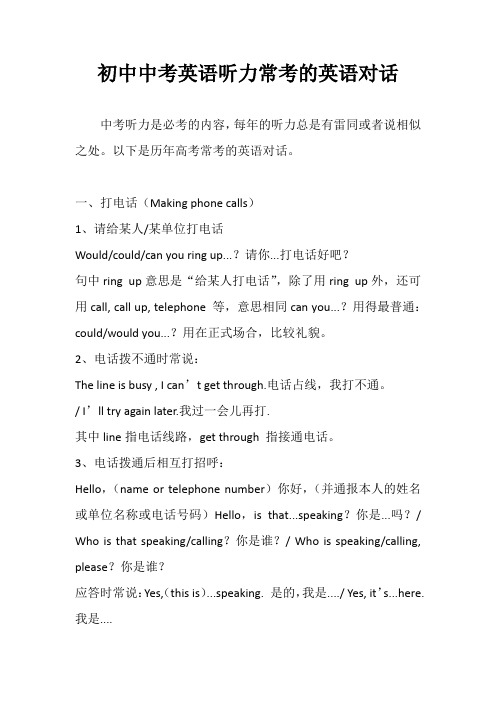
初中中考英语听力常考的英语对话中考听力是必考的内容,每年的听力总是有雷同或者说相似之处。
以下是历年高考常考的英语对话。
一、打电话(Making phone calls)1、请给某人/某单位打电话Would/could/can you ring up...?请你...打电话好吧?句中ring up意思是“给某人打电话”,除了用ring up外,还可用call, call up, telephone 等,意思相同can you...?用得最普通:could/would you...?用在正式场合,比较礼貌。
2、电话拨不通时常说:The line is busy , I can’t get through.电话占线,我打不通。
/ I’ll try again later.我过一会儿再打.其中line指电话线路,get through 指接通电话。
3、电话拨通后相互打招呼:Hello,(name or telephone number)你好,(并通报本人的姓名或单位名称或电话号码)Hello,is that...speaking?你是...吗?/ Who is that speaking/calling?你是谁?/ Who is speaking/calling, please?你是谁?应答时常说:Yes,(this is)...speaking. 是的,我是..../ Yes, it’s...here. 我是....4、打电话请对方找人或留言:Is...in/at home?某某在家吗?/ Can/may/could I speak to..., please?请...接电话好吗?/ Will/would you give a message to..., please?请给...捎个口信好吗?/ Would you tell him my telephone number, please?请你把我的电话号码告诉他好吗?/ Can/could you ask...to ring me back, please?请叫...给我回个电话好吗?应答时常说:Hold on/Wait a minute/One moment, please. 请等一等/ I’m sorry...is not in./at home now.对不起,...现在不在/ Can I take a message?我能给你捎口信好吗?/ Does he have your telephone number?他有你的电话号码吗?/ I’ll ask him to call you back. 我叫他给你回电话二、劝告和建议(Advice and suggestion)1、You’d better(not)do sth... 你最好(不)干..../ You should do sth. 你应该干..../ You need(to)do sth. 你需要干....2、Why don’t you do sth?为什么不..../ Why not do sth?为什么不....这是以反问的方式提出劝告或建议,含有建议对方去干某事的意思,而不是询问对方为何不去干某事的原因。
九年级英语听说人机对话考试情景对话练习话题
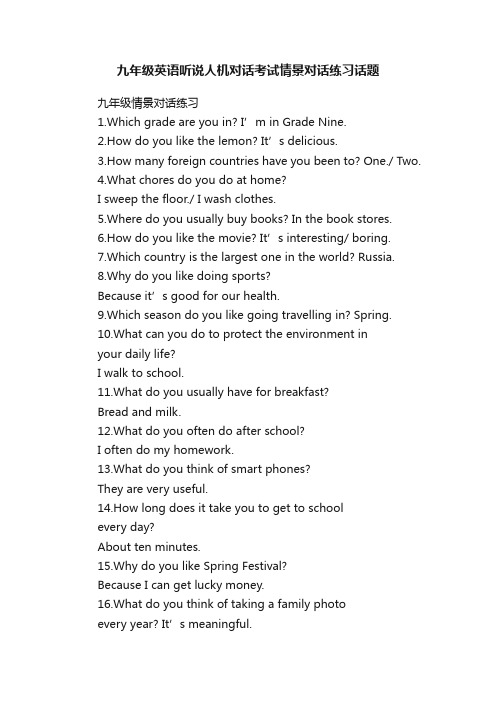
九年级英语听说人机对话考试情景对话练习话题九年级情景对话练习1.Which grade are you in? I’m in Grade Nine.2.How do you like the lemon? It’s delicious.3.How many foreign countries have you been to? One./ Two.4.What chores do you do at home?I sweep the floor./ I wash clothes.5.Where do you usually buy books? In the book stores.6.How do you like the movie? It’s interesting/ boring.7.Which country is the largest one in the world? Russia.8.Why do you like doing sports?Because it’s good for our health.9.Which season do you like going travelling in? Spring.10.What can you do to protect the environment inyour daily life?I walk to school.11.What do you usually have for breakfast?Bread and milk.12.What do you often do after school?I often do my homework.13.What do you think of smart phones?They are very useful.14.How long does it take you to get to schoolevery day?About ten minutes.15.Why do you like Spring Festival?Because I can get lucky money.16.What do you think of taking a family photoevery year? It’s meaningful.17.Where did you stay when you went travellinglast time?In the hotel.18.What’s your hometown famous for?My hometown is famous for kites.19.What kind of music do you usually listen to? Classical music.20.Which month is the best time to visit your hometown? May.21.What time do you usually get up on weekdays?At six o’clock.22.Which country would you like to travel toduring the summer holiday?France.23.How many years have you learnt English?For six years.24.Where do you usually have lunch on weekdays?At home.25.What housework do you need to do at home?I need to sweep the floor at home.26.When does school usually finish in the afternoon?At five o’clock.27.Which subject are you bad at?Maths.28.How often do you wash your hair?Twice a week.29.What do you think of fast food?It’s unhealthy.30.What shouldn’t we do in the classroom?We shouldn’t eat in the classroom.31.Which month is the Mid-Autumn Festival in?It’s in S eptember or October.32.What’s the weather like in winter in Weifang?It’s cold.33.How will you deal with your old books?I sell them.34.Who taught you to write?My mother./ My teacher.35.What would you do to thank the teacher you like best?I will study harder.36.Which month is Weifang International Kite Festival in? April.37.How often do you clean your bedroom?Once a day.38.Where do you usually look for information?In the book./ On the Internet.39.Who will you ask for advice if you have a problem? My teacher./ My parents.40.What can we do to save water in our daily life?We can reuse water./ We can turn off the tap when we don’t use water.41.How many people are there in your family?Four.42.How many times do you shop online every week? Once a week.43.Who does most of the housework at your home?My mother.44.When do you usually play sports?After school./ At the weekend.45.What do you think of studying abroad?It’s very interesting.46.What do you think of listening to music while driving?It’s exciting/ dangerious.47.Which public holiday in China do you like best? National Day.48.How many times a month do you go to the library? Once./ Twice.49.Where do your parents usually take a walk after supper?In the park.50.If you don’t have br eakfast, how will you feel at school?I will feel hungry and tired.51.Which season do you like best?I like spring best.52.When is Children’s Day? It’s on June 1st.53.How many hours do you watch TV a day?Half an hour.54.What do you think of your family rules?They are strict.55.How will you feel if you fail an exam?I will feel upset.。
初中阶段情景交际——听力与口语资料(全)

初中阶段情景交际——听力与口语资料(全)1. 问候(Greetings)A. —Hi, Mike.—Hi, Lucy.B. —Hello, I'm Mike. What's your name?—My name is Sandy. Nice to meet you.—Nice to meet you, too.C. —Good morning/afternoon/evening.—Good morning/afternoon/evening.D. —Glad/Pleased to meet you.—Glad/Pleased to meet you, Andy.E.—How are you?/How are you doing(going)?/How is it going?/How’s everything going? (“最近过得怎么样?”多用于电话或信件开头)—Great(很好)/Not bad(还不错)/Terrible(糟糕)F.—How do you do?(你好)—How do you do?(你好)2.致谢(Thanks)Thank you./Thanks very much. =That's /It’s very kind/nice of you.(你真是太好了,相当于“谢谢”)答:—My pleasure. /It’s a pleasure.(我的荣幸)—You are welcome. (不客气)—Don't mention it. (不足挂齿)—Not at all.(不客气)3. 道歉(Apologies)—I'm sorry.—That's OK./That’s all right./It doesn’t matter./Never mind. (没关系)注意区分:That’ right.正确That’s all right.=That’s OK.没关系All right =OK 好的4. 邀请(Invitation)A. —Would you like to go and see a film?—Yes, I'd like to. (我很乐意)/Of course.(当然)/I'd love to, but I'm afraid I have no time.(我很乐意,但是恐怕我没有时间)B. —Could you come to my party?—Sure. /Of course./certainly.—I'd love to,but I have to……(我很乐意,但是我不得不……)—Sorry,I can’t. I have to……—I’m afraid not.(恐怕不能)5. 请求允许(Asking for permission)A. —Can/could/May I do …….?—Sure. /Of course./certainly.—I’m afraid not.B. —Can/could/ you do …….?—Sure. /Of course./certainly./No problem(没问题)/with pleasure.(乐意效劳)—I’m afraid not.(恐怕不能)—Sorry,I can’t. I have to……—No way.(没门)6. 祝愿和祝贺(Expressing wishes and congratulations)—Have a nice day! /Have a good time! /Enjoy yourself.(用于对方旅行玩耍的祝愿)—Best wishes! (通用)—Wish your team good luck. /Good luck.(用于对方比赛match或者考试test的祝福)—Congratulations.(恭喜,用于对方毕业graduation或者取得好成绩get good grades或者奖项win the prize (get the first place)的祝贺)—Thank you.(答语,通用)—The same to you.(你也一样,用于回复公共节日Happy New Year等的祝福)7. 打电话(Making telephone calls)A. —Hello,May I speak to Daniel, please? (我能跟Daniel通电话吗?)—Sorry, he's not at home. Who's that speaking, please? (你是谁?)—This is Sam. Can you ask him to call me back?(回电话)B.—Hi, This is Jane speaking.Is that Li Lei?(你是李磊吗?)—Hi, Jane. How are you doing?注意:电话用语,除了“May I……”句型用“I”表示“我”,其余都用“This”代表“我”,“that”代表“你”。
人教版初一英语听力长对话理解练习题30题【含答案解析】

人教版初一英语听力长对话理解练习题30题【含答案解析】1.What does the boy usually do after school?A. Play footballB. Do his homeworkC. Watch TV答案:A。
解析:在听力对话中,男孩明确提到他放学后通常会踢足球,所以答案为A。
2.Who is the girl's favorite teacher?A. Mr. SmithB. Miss GreenC. Mrs. Brown答案:B。
解析:从对话里女孩说“Miss Green is my favorite teacher.”可以得出答案是B。
3.What time does the family have dinner?A. At 6:00B. At 6:30C. At 7:00答案:C。
解析:根据对话中的“Our family has dinner at 7:00.”可知答案为C。
4.Where does the boy play basketball?A. In the parkB. At schoolC. In the yard答案:B。
解析:对话中男孩说他在学校打篮球,所以答案是B。
5.What instrument does the girl like to play?A. PianoB. GuitarC. Violin答案:A。
解析:从对话里女孩说“I like to play the piano.”可知答案为A。
6.Who often helps the mother with housework?A. The fatherB. The sonC. The daughter答案:C。
解析:在听力中提到女儿经常帮助妈妈做家务,所以答案为C。
What subject does the boy think is difficult?A. MathB. EnglishC. Chinese答案:A。
初中生英语对话情景对话练习
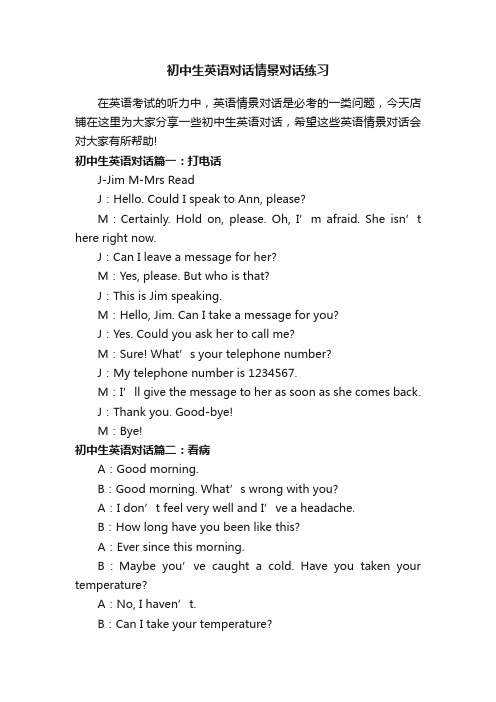
初中生英语对话情景对话练习在英语考试的听力中,英语情景对话是必考的一类问题,今天店铺在这里为大家分享一些初中生英语对话,希望这些英语情景对话会对大家有所帮助!初中生英语对话篇一:打电话J-Jim M-Mrs ReadJ:Hello. Could I speak to Ann, please?M:Certainly. Hold on, please. Oh, I’m afraid. She isn’t here right now.J:Can I leave a message for her?M:Yes, please. But who is that?J:This is Jim speaking.M:Hello, Jim. Can I take a message for you?J:Yes. Could you ask her to call me?M:Sure! What’s your telephone number?J:My telephone number is 1234567.M:I’ll give the message to her as soon as she comes back.J:Thank you. Good-bye!M:Bye!初中生英语对话篇二:看病A:Good morning.B:Good morning. What’s wrong with you?A:I don’t feel very well and I’ve a headache.B:How long have you been like this?A:Ever since this morning.B:Maybe you’ve caught a cold. Have you taken your temperature?A:No, I haven’t.B:Can I take your temperature?A:OK.B:Oh, you’ve got a fever.A:Is it serious?B:Nothing serious.A:What should I do then?B:You can take some medicine and drink much water.A:How often should I take this medicine?B:You can take this medicine three times a day and you’ll be all right soon.A:Thank you, doctor. I’ll do as you say. Bye!B:Bye!初中生英语对话篇三:购物A:Good morning. Can I help you?B:Yes, please. I want to buy a pair of shoes. Can you show me one?A:What size do you need?B:Size 38.A:How about those ones?B:I don’t like this color. Have you got any other colors?A:Yes. How about this one?B:It looks nice. Can I try them on?A:Sure.B:Oh, it’s just right. Where is it made?A:It’s made in Japan. It’s very comfortable.B:How much are they?A:100 yuan.B:It’s too expensive. I can’t afford it. Have you got a cheaper one?A:Well. I’m afraid it’s the cheapest one.B:OK. I’ll take it. Here is the money.A:Thank you. Good-bye!B:Bye!初中生英语对话篇四:问路A:Excuse me. Where is the nearest post office, please?B: Sorry,I don’t know. You’d better ask the policeman over there. He may know.A:Thank you all the same.B:Excuse me. Which is the way to the post office, please?C:Go down this street and take the first turning on the right. Go across the bridge and you’ll find the post office on the left. It’s between the city library and the hospital. You can’t miss it.A:How far is it from here?C:It’s about 30 minutes’ walk. You’d better catch a bus.A:Which bus do I need?C:I think you need a number 16 bus. The bus will take you there.A:Thank you very much.C:You’re welcome.初中生英语对话篇五:约定A:What are you going to do next Sunday?B:Nothing much(Nothing special).A:Shall we go to the park and play football?B:Good idea.A:How can we get there?B:By bike.A:Where shall we meet?B:How about meeting at the gate of our school?A:When shall we meet?B:At 8:30.A:Why not meet a little earlier? Let’s make it half pastseven.B:OK.A:See you then.B:See you.。
初中英语听力最常考的30个对话情景_中考英语
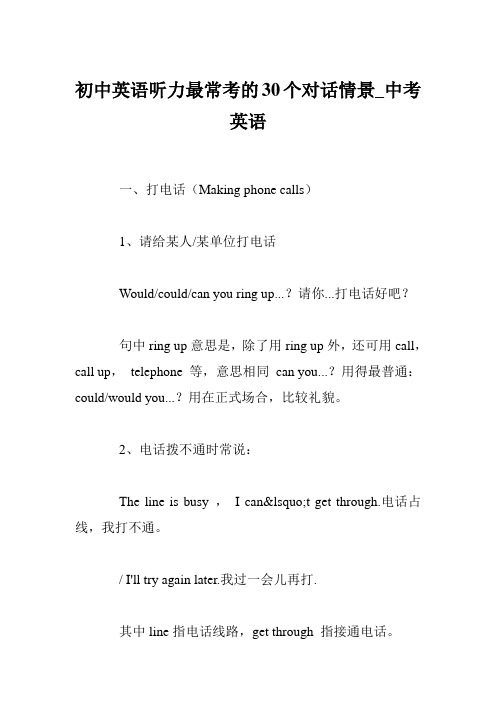
初中英语听力最常考的30个对话情景_中考英语一、打电话(Making phone calls)1、请给某人/某单位打电话Would/could/can you ring up...?请你...打电话好吧?句中ring up意思是,除了用ring up外,还可用call,call up,telephone 等,意思相同can you...?用得最普通:could/would you...?用在正式场合,比较礼貌。
2、电话拨不通时常说:The line is busy ,I can‘t get through.电话占线,我打不通。
/ I'll try again later.我过一会儿再打.其中line指电话线路,get through 指接通电话。
3、电话拨通后相互打招呼:Hello,(name or telephone number)你好,(并通报本人的姓名或单位名称或电话号码)Hello,is that...speaking?你是...吗?/ Who is that speaking/calling?你是谁?/ Who is speaking/calling,please?你是谁?应答时常说:Yes,(this is)...speaking. 是的,我是..../ Yes,it‘s...here. 我是....4、打电话请对方找人或留言:Is...in/at home?某某在家吗?/ Can/may/could I speak to...,please?请...接电话好吗?/ Will/would you give a message to...,please?请给...捎个口信好吗?/ Would you tell him my telephone number,please?请你把我的电话号码告诉他好吗?/ Can/could you ask...to ring me back,please?请叫...给我回个电话好吗?应答时常说:Hold on/Wait a minute/One moment,please. 请等一等/ I‘m sorry...is not in./at home now.对不起,...现在不在/ Can I take a message?我能给你捎口信好吗?/ Does he have your telephone number?他有你的电话号码吗?/ I'll ask him to call you back. 我叫他给你回电话二、劝告和建议(Advice and suggestion)1、You‘d better (not)do sth... 你最好(不)干..../ You should do sth. 你应该干..../ You need(to)do sth. 你需要干....2、Why don‘t you do sth?为什么不..../ Why not do sth?为什么不....这是以反问的方式提出劝告或建议,含有建议对方去干某事的意思,而不是询问对方为何不去干某事的原因.3、What/How about +名词或动名词...?这种句型表达随便的建议,有征求对方意见的意思,多数情况下是建议和对方一起做某事。
初中英语人机对话之情景对话练习题超全
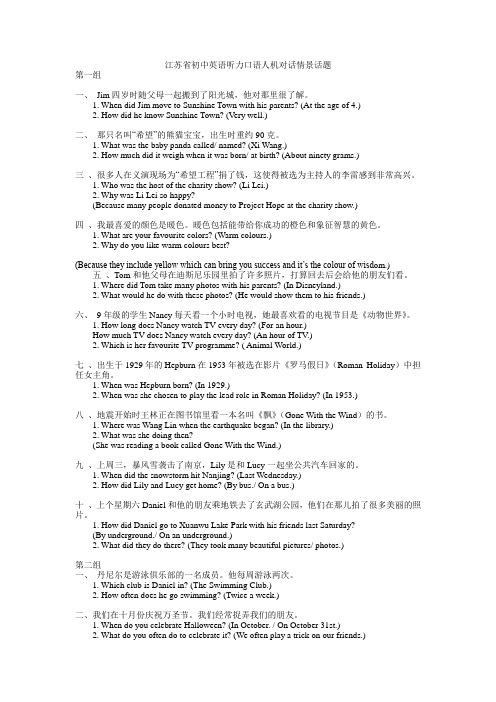
江苏省初中英语听力口语人机对话情景话题第一组一、Jim四岁时随父母一起搬到了阳光城,他对那里很了解。
1. When did Jim move to Sunshine Town with his parents? (At the age of 4.)2. How did he know Sunshine Town? (Very well.)二、那只名叫“希望”的熊猫宝宝,出生时重约90克。
1. What was the baby panda called/ named? (Xi Wang.)2. How much did it weigh when it was born/ at birth? (About ninety grams.)三、很多人在义演现场为“希望工程”捐了钱,这使得被选为主持人的李雷感到非常高兴。
1. Who was the host of the charity show? (Li Lei.)2. Why was Li Lei so happy?(Because many people donated money to Project Hope at the charity show.)四、我最喜爱的颜色是暖色。
暖色包括能带给你成功的橙色和象征智慧的黄色。
1. What are your favourite colors? (Warm colours.)2. Why do you like warm colours best?(Because they include yellow which can bring you success and it’s the colour of wisd om.)五、Tom和他父母在迪斯尼乐园里拍了许多照片,打算回去后会给他的朋友们看。
1. Where did Tom take many photos with his parents? (In Disneyland.)2. What would he do with these photos? (He would show them to his friends.)六、9年级的学生Nancy每天看一个小时电视,她最喜欢看的电视节目是《动物世界》。
初中英语听说情景交际中考常考点

情景交际中考常考点考点1.问候、介绍与告别1.常见的问候用语有:Good morning/afternoon/evening!Hello/Hi!How do you do?Nice to see(meet)you.How are you?等。
答语可以是别人怎么打招呼,你也怎么回。
如:Good morning/afternoon/evening!Hello/Hi!How do you do? Nice to see(meet)you.等。
How are you?的回答一般是:Fine,thank you.And you?或者Very well,thank you.如:—How are you these days,Mary?—Fine,Thank you.And you,Tom?2.常见的介绍用语有:This is.../My(His/Her)name is...3.常见的告别用语有:Good bye/Bye-bye/Bye!See you later/tomorrow.Good night!等。
考点2.感谢、祝愿与同情遗憾1.当别人帮了你或赞扬你时,你应该说感谢的话。
常用的感谢用语有:Thank you very much.Thanks a lot. Many thanks.Thanks for...That’s very kind of you等。
答语有:My pleasure.That’s all right.You are welcome.Not at all.Don’t mention it.等。
如:—Thank you for sending me home tonight.—My pleasure.2.当别人发生了不幸的事情时,你应该说同情与遗憾的话。
表达同情遗憾的常用语有:What a pity!;I am sorry to hear that.等。
如:—I lost my iPod on my way to my office.—I am sorry to hear that.考点3.打电话1.请……(某人)听电话时的常用语有:Hello.May I speak to...,please?/Is that...speaking?2.接电话时的常用语有:Hold on,please.He/She isn’t in.Can I take a message?This is...speaking.3.在电话中介绍自己用:This is...。
- 1、下载文档前请自行甄别文档内容的完整性,平台不提供额外的编辑、内容补充、找答案等附加服务。
- 2、"仅部分预览"的文档,不可在线预览部分如存在完整性等问题,可反馈申请退款(可完整预览的文档不适用该条件!)。
- 3、如文档侵犯您的权益,请联系客服反馈,我们会尽快为您处理(人工客服工作时间:9:00-18:30)。
初中听力的30个常考情景对话英语听力总让许多同学感到害怕,就连英语成绩不错的同学们也表示做起来有压力,那么怎样才能攻克听力这个难关呢?下面,小编在这给大家带初中听力的30个常考情景对话,欢迎大家借鉴参考!一、打电话(Making phone calls)1、请给某人/某单位打电话Would/could/can you ring up...?请你...打电话好吧?句中ring up意思是“给某人打电话”,除了用ring up外,还可用call, call up, telephone 等,意思相同 can you...?用得最普通:could/would you...?用在正式场合,比较礼貌。
2、电话拨不通时常说:The line is busy , I can‘t get through.电话占线,我打不通。
/ I’ll try again later.我过一会儿再打.其中line指电话线路,get through 指接通电话。
3、电话拨通后相互打招呼:Hello,(name or telephone number)你好,(并通报本人的姓名或单位名称或电话号码)Hello,is that...speaking?你是...吗? / Who is that speaking/calling?你是谁?/ Who is speaking/calling, please?你是谁?应答时常说:Yes,(this is)...speaking. 是的,我是..../ Yes, it‘s...here. 我是....4、打电话请对方找人或留言:Is...in/at home? 某某在家吗?/ Can/may/could I speak to..., please?请...接电话好吗?/ Will/would you give a message to..., please?请给...捎个口信好吗? / Would you tell him my telephone number, please? 请你把我的电话号码告诉他好吗?/ Can/could you ask...to ring me back, please?请叫...给我回个电话好吗?应答时常说:Hold on/Wait a minute/One moment, please. 请等一等/ I‘m sorry...is not in./at home now.对不起,...现在不在 / Can I take a message? 我能给你捎口信好吗?/ Does he have your telephone number?他有你的电话号码吗?/ I’ll ask him to call you back. 我叫他给你回电话二、劝告和建议(Advice and suggestion)1、You‘d better (not)do sth... 你最好(不)干..../ You should do sth. 你应该干..../ You need(to)do sth. 你需要干....2、Why don‘t you do sth? 为什么不..../ Why not do sth? 为什么不....这是以反问的方式提出劝告或建议,含有建议对方去干某事的意思,而不是询问对方为何不去干某事的原因.3、What/How about +名词或动名词...? 这种句型表达随便的建议,有征求对方意见的意思,多数情况下是建议和对方一起做某事。
4、“Shall we...?”这种句型用于建议对方与自己一起做什么,是一种普通的表示建议的方法。
它和“Let‘s..., shall we?”句型可以互换,在回答时,如果赞成这个建议,常用“Yes, let's…”或“OK, let’s…”5、用suggest作谓语的陈述句这种句子用于表达比较正式的建议,在会议上和讨论中使用较多,也常用于书面形式,后面常跟名词、动名词或that从句作宾语.注意跟从句时,从句中动词用动词原形式should+动词原形。
6、用Let‘s开头的祈使句这是最普通的表达建议的方法,建议对方和自己一起做什么.let's后接动词原形.若句尾加上“shall we?”, “OK?”等用于征求对方法的词语,从而使语气委婉得多。
注意:对对方的建议表示同意时常用的答语为:Great太好了,That‘s a good idea.真是个好主意。
对对方的建议表示不同意,或根本不能满足对方的要求而表示歉意时的常用答语为:I’m afraid that... 我担心....,我恐怕.....I‘m afraid not. 恐拍不行。
7、用should,ought to等情态动词来表示“劝告”8、用动词advise,名词advice表示劝告三、表示问候(Expressing greetings)1、直接问候一般打招呼用语,答语通常是重复对方的话Hello.你好!Hi嗨!Good morning(afternoon, evening)早上(下午、晚上)好2.您好!初次见面打招呼的用语How do you do? / Glad to meet you.答语也是“How do you do? / Glad to meet you.”3.对有一段时候没有见面的熟人可选用这些句型:How are you?/ How have you been?你(您)好吗?答语往往是:“Fine, thank you. And you?”4.向认识但不常见面的人打招呼,可选用这些表达法. How‘s everything with you?/ How is everything going? / How are you getting on? / What’s no/ up? 近来怎么样?答语可用:“Pretty well“/ ” Very well“ ”Everything is OK(一切顺利)“Not too bad“还好”5.对于不认识想要叫他(她)停下来时,可选用这些说法:Hey, sir(madam)喂,先生(小姐)/ Just a moment, sir(madam)等一下,先生(小姐)注意:此时不能说:“Hey! You!”2、间接问候1.Please give one‘s(one’s 代表不同人称的物主代词(如: my, our... 等)regards/best wishes/ love to.../ Please remember me to sb.请向某人问好/请向某人致意。
2.“Say hi/hello to...(from me)”意为“向...致意/问候”.这相当于Please give my best regards/wishes to...(请代我向...问好)的意思。
对于上述问候,其答语为:Of course/Sure , I will等。
四、感谢与应答(Thanks and responses)Thank you/ Thanks谢谢! / Thank you very much非常感谢! / Thank you so much/ Thanks a lot多谢 / Thank you very much indeed 应该好好感谢你 / Thanks a million万分感谢! / I don‘t know how to thank you真不知该怎样感谢你I’m really grateful to you.非常感谢你! That‘s most kind of you你心眼儿真好/ You’re kind! 你真好。
如果别人想为你办事,可你觉得不必麻烦他或者别人替你办事没有办成但你还要感谢他,这时你可以说:Thank you just the same.同样感谢你的好意 / Thank you all the same.同样得感谢你/ It‘s very considerate of you.你考虑得真周到!/ It’s most thoughtful of you.你想得真周到!在回答别人的感谢时,常说:You‘re welcome不客气 / Not at all 没事儿/ Don’t mention it 不用谢/ It‘s my pleasure 我很乐意. / No trouble at all 一点也不麻烦 / It was the least I could do 这是我应该做的/ I’m glad I could do it.我很高兴能这么做/ That‘s all right.没关系,不用谢/ I’m delighted to have been able to do that for you 能为你效劳我很高兴/ It‘s really nothing at all 算不了什么,不用谢五、介绍(Introductions)介绍某人的常用表达式I‘ll introduce you.我来给你介绍......../ I want to introduce.....我想介绍.... / May I introduce you to...? 我把你介绍给...好吗? / I’d like you to meet... 我想让你见见.... /It‘s with great pleasure that I introduce.....t o you.很荣幸让我介绍.......给你./ Let me introduce you to......让我把你介绍给....... / By the way, do you know......? 顺便问一问,你认识.......吗?对介绍的应答How do you do? 你好!/ I‘m pleased to know you.很高兴认识你./ Very glad to meet you.很高兴认识你./ Nice to meet you.很高兴认识你. / It’s a pleasu re to meet you.认识你很高兴。
六、祝愿、祝贺及应答(Good wishes, congratulations and responses)1、当某人取得成功时I have passed the examination! 我已经通过考试了.Congratulations(to you)祝贺你!2、当某人外出旅行时Good luck with your trip! 祝您们旅途平安! Have a good trip/journey.=I wish you a good trip/journey.祝你旅途愉快,祝你一路顺风。
